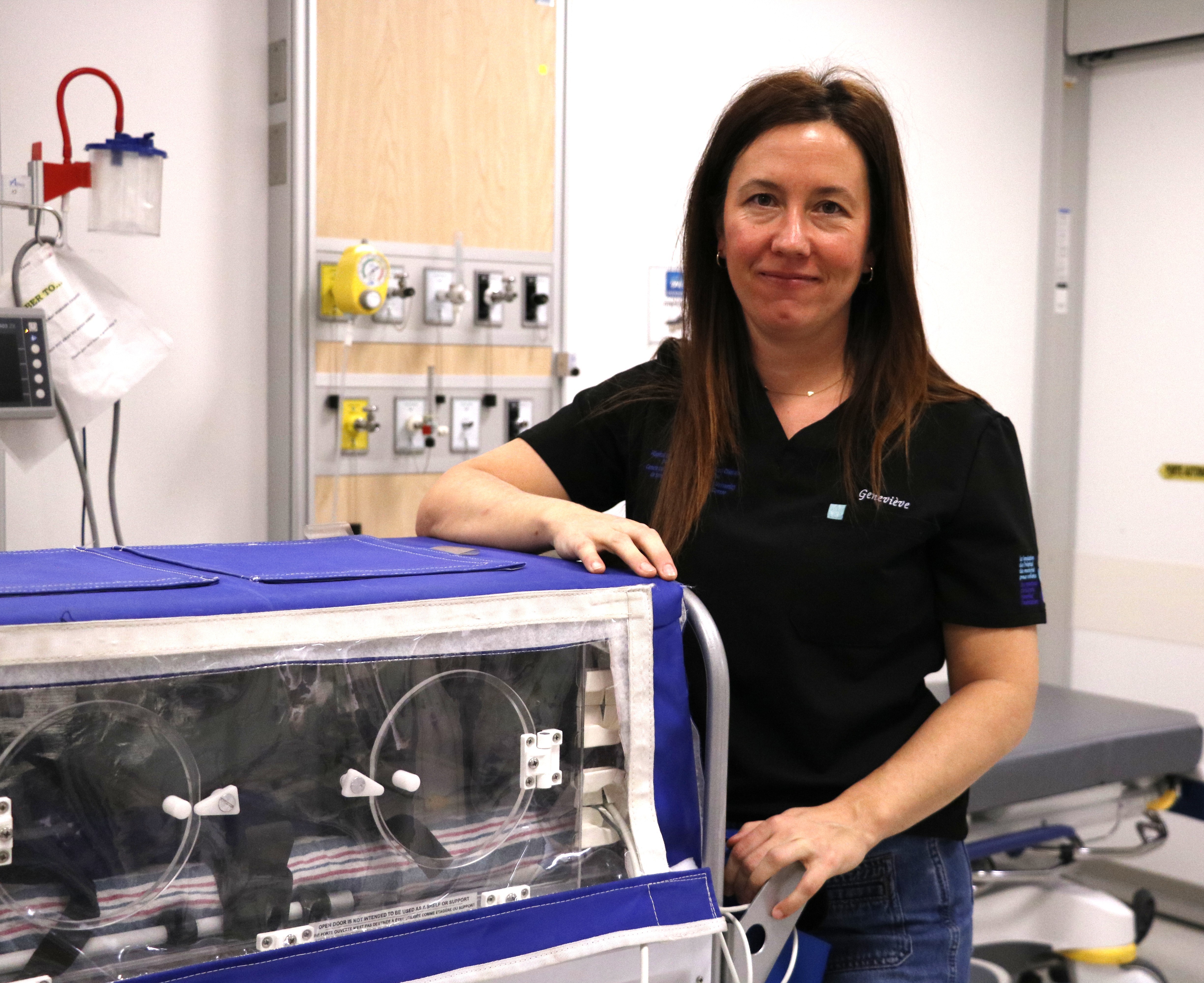
Celebrating Critical Care Transport Nurses at the MCH
18 February 2026
Rise in respiratory infections and measles outbreak: important infection prevention measures at the Montreal Children’s Hospital.
Read moreWelcome to the Montreal Children's Hospital
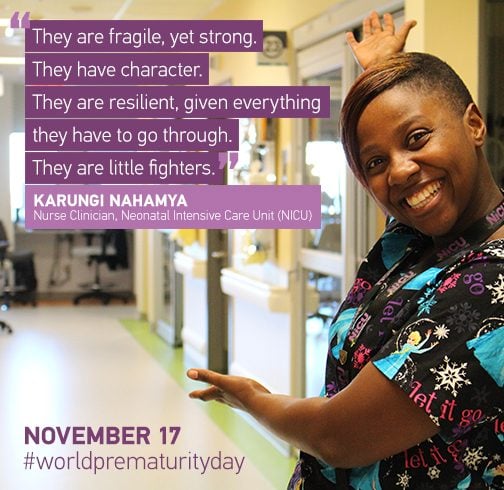
13 November 2015
November 17th marks World Prematurity Day. Every year, approximately 15 million babies are born prematurely, accounting for more than one in 10 of all babies born worldwide. Join us in thanking all of our Neonatal Intensive Care Unit (NICU) and new Neonatal Follow Up clinic staff for the indispensable work they do every day!
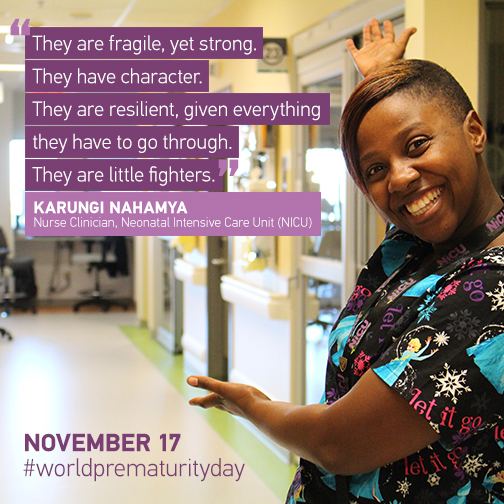 Karungi Nahamya, Nurse Clinician, Neonatal Intensive Care Unit (NICU)
Karungi Nahamya, Nurse Clinician, Neonatal Intensive Care Unit (NICU)
“Premature babies are different from other pediatric patients,” says Nurse Clinician, Karungi Nahamya, who has been working in the NICU for nearly 3 years. “They are fragile, yet strong. They have character. They are resilient, given everything they have to go through. They are little fighters.”
Because of the fragility of her patients, Karungi says working with premature infants has made her a more cautious and vigilant nurse. “Because of their size, the slightest change can create instability,” she says. “You really have to have the skills to know how to manipulate a premature baby and pay attention to subtle cues which may indicate that a baby’s state is deteriorating. I have become a much more compassionate and creative nurse because of what I have learned in working with very tiny babies. By getting to know my patients and their families, listening to their concerns and asking questions, I am able to be an advocate for these babies and their families.”
While she says that her job is rewarding in countless ways, the best part is being able to follow a patient throughout their transition. “When I work with a baby who arrives in the unit and is very sick, but is slowly able to get off respiratory support after a few weeks and then starts bottle feeding, and finally is able to go home and thrive…that’s really the best part.”
Megan Smith-Morin, Occupational Therapist, Neonatal Intensive Care Unit
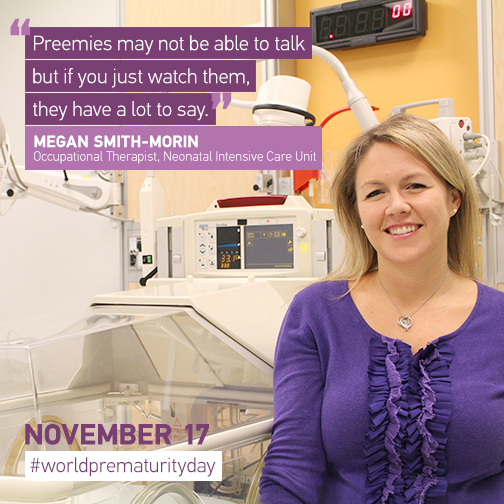
“Preemies may not be able to talk but if you just watch them, they have a lot to say,” says Megan Smith-Morin, a pediatric Occupational Therapist who has worked in the Neonatal Intensive Care Unit of the Montreal Children’s Hospital for the past 3 years. “Observing their behaviours, their movements and their facial expressions helps me to appreciate their readiness for interaction and manipulations. I’m able to make recommendations to the healthcare team and to parents in order to foster optimal development of the preemie baby.”
Some of Megan’s recommendations may involve decreasing environmental stressors such as lights, sounds and touch, or positioning strategies in the bed or in parent’s arms so that parents can benefit from bonding with their baby.
“The most rewarding part of my work often comes when I am able to help parents experience firsts with their babies,” says Megan. “I’m often with families when they get to give their child a bottle for the first time. It’s such a normal step that parents can`t wait to live with their baby, but preemies can have trouble feeding and it can take a very long time to get to that moment. It’s an emotional experience. The parents are overwhelmed with happiness in the moment and the babies are happy to be finally feeding by bottle or by breast. Parents often take pictures to document this wonderful milestone. I’m happy that I get to be a part of it.”
Dr. May Khairy, Pediatrician, Neonatal Follow-Up Clinic
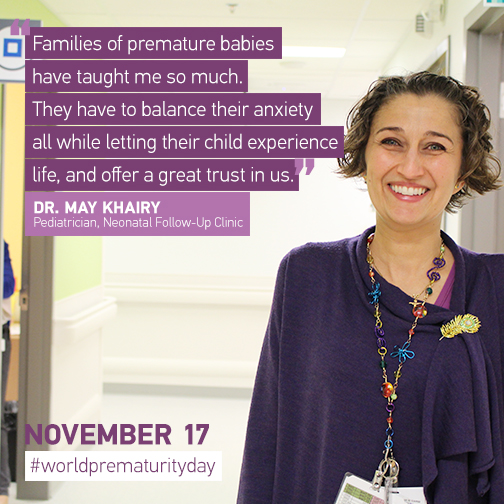
“Premature babies look so fragile and vulnerable, but they are also resilient, brave and strong,” says Dr. May Khairy, pediatrician in the Neonatal Follow-Up Clinic at the Montreal Children’s Hospital. “They surprise you every day.”
Dr. Khairy is part of a multidisciplinary team that provides developmental assessment and long term follow-up of premature babies during hospitalization and after their discharge until patients reach school age. “We monitor their development and help evaluate them for a variety of medical and feeding issues that can arise due to their preterm birth. We also help reassure and guide families who may observe issues in their child and wonder, ‘is this normal’? We can help normalize what is typical for preemies and offer referrals to other services, exercises or feeding guidance to ensure that babies have what they need for their growth and development.”
When asked about the best part of her role as a pediatrician working with such tiny babies, Dr. Khairy is quick to insist there are countless highlights to her work. “Families of premature babies have taught me so much. They have to balance their anxiety all while letting their child experience life, and offer a great trust in us.”
“For me the best part is when I can see a family breathe a sigh of relief and see that things will be okay. Each baby step is really a small victory.”